College Students: Stay and Engage
Now is not the time to abandon American universities

AP Photo/Ted Shaffrey

AP Photo/Ted Shaffrey

AP Photo/Ted Shaffrey
We are reading and hearing a lot about how Jewish students are experiencing the college campus these days.
There are plenty of Jewish students who, in the past two months, have embraced their Judaism and Jewish communities like never before. These formerly Jewishly uninvolved students have started untucking their Magen David necklaces, showing up to communal Shabbat dinners, and wearing kippot around campus, among other things. Many have become leaders in speaking out against Jew-hatred and bringing Jewish students together in the face of crisis.
For many, though, the last seven weeks have been defined by fear and anxiety, as they constantly wonder who among their peers was on the other side of the protests, and who among their professors signed anti-Israel statements. Campus anti-Israel sentiment has taken over their consciousness in a debilitating way. In response, many Jewish students I know have been telling me they want to just get out. Whether that means cramming credits to graduate early, changing graduate school plans, or spending weekends at home, a high number of my peers reasonably want no part of life on campus anymore.
But now is not, I want to argue, the time for an exodus from American college campuses. At least for the time being, universities continue to play an important role for students and for the Jewish people—not least because they attract talented and ambitious students, and the conversations that are possible there are still vital. Ideas, policies, and cultural conversations that will profoundly influence the character of our country and the world begin on college campuses, in and out of classes, with students and professors, and through long-lasting relationships and social networks that are formed there.
And there is one more reason why now is not the time to abandon American universities, and it is, in fact, one of the essential goals of higher education: building resilience.
It should go without saying that no college student should tolerate physical or verbal threats to their safety, nor should we be subjected to the kinds of intimidating antisemitism that we are seeing on certain campuses right now. We must keep demanding that administrations respond forcefully, that they meet their responsibility to maintain healthy and productive learning environments for all.
But here’s the thing: I have friends literally in Gaza right now. They are putting their lives on the line for the State of Israel and the Jewish people. If my fellow American Jews and I can’t manage to stay on college campuses, something is seriously wrong.
When we focus only on those who hate us, we give them power over us, we homogenize an overly negative Jewish experience, and we ignore key aspects of what college is supposed to be about: learning how to confront adversity. Strengthening our Jewish identities and communities. Taking on leadership roles. Engaging with competing worldviews and narratives, both in and out of the classroom. Getting comfortable in the uncomfortable. And, yes, sometimes even standing up to those who hate us. A college experience void of these fundamental areas of growth does not, to me, resemble a college experience at all.
I had already been planning to study Middle Eastern history, and now more than ever I feel secure in that decision. Spending time with classmates and professors who disagree with me is about more than just understanding other perspectives on the conflict itself; it is about trying to understand the underlying framework through which my ideological adversaries view the world. The more progress we make on that front, the less we will talk past each other in important conversations about our peoples’ futures.
So what will it take for more of us to engage?
It begins with education. The Jewish community needs more kids in Jewish day schools, camps, summer programs, and gap year programs in Israel. At home, families can invest more time reading, learning, and living out a connection to Judaism and Israel. Without strong Jewish identities and a baseline of literacy, how can we reasonably expect any young Jewish adult to engage in this world of hostility, complex historical narratives, and vast ideological diversity?
When it comes to being ready to engage, there is no substitute for a baseline of literacy. It’s not too late for our next generation, but the American Jewish community needs to be honest about the ways it has failed on this.
So, to the adults who are wondering what this means for you: Support us, check in with us, and be there for us. Fear is real and should be taken seriously. But do not coddle us. Push us, engage with us intellectually, and model for us a commitment to learning and deepening knowledge, even when that means confronting really uncomfortable ideas. The more we enable a culture of ideological echo chambers, the less prepared we will all be to face the harsh realities of the real world.
And to my peers on college campuses wondering if you should stay or go: Stick with it. I know I am. If we collectively commit to staying engaged, we will grow as individuals, help secure a strong Jewish future and, maybe, begin to heal this broken world.
Elisha Baker is a sophomore at Columbia University studying Middle East history. He wears a kippah (and occasionally a large Israeli flag) on campus, and has published several Israel-related articles for Columbia periodicals.